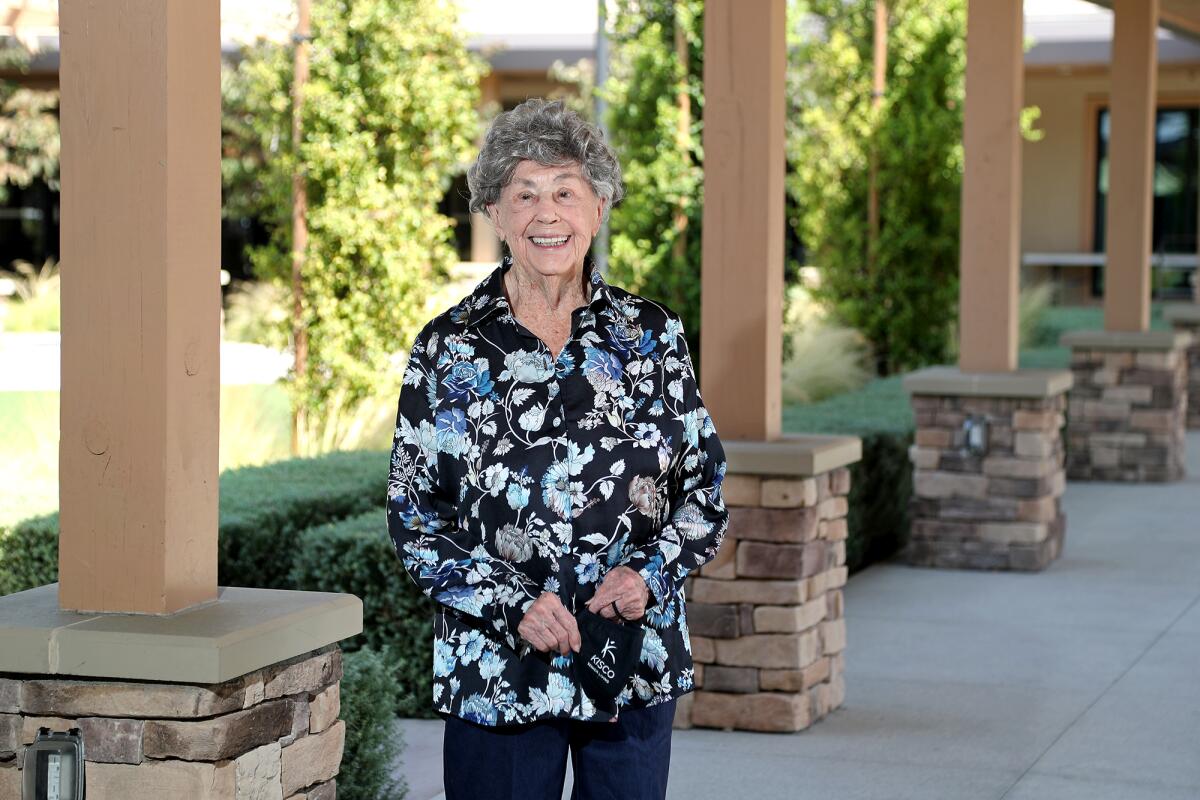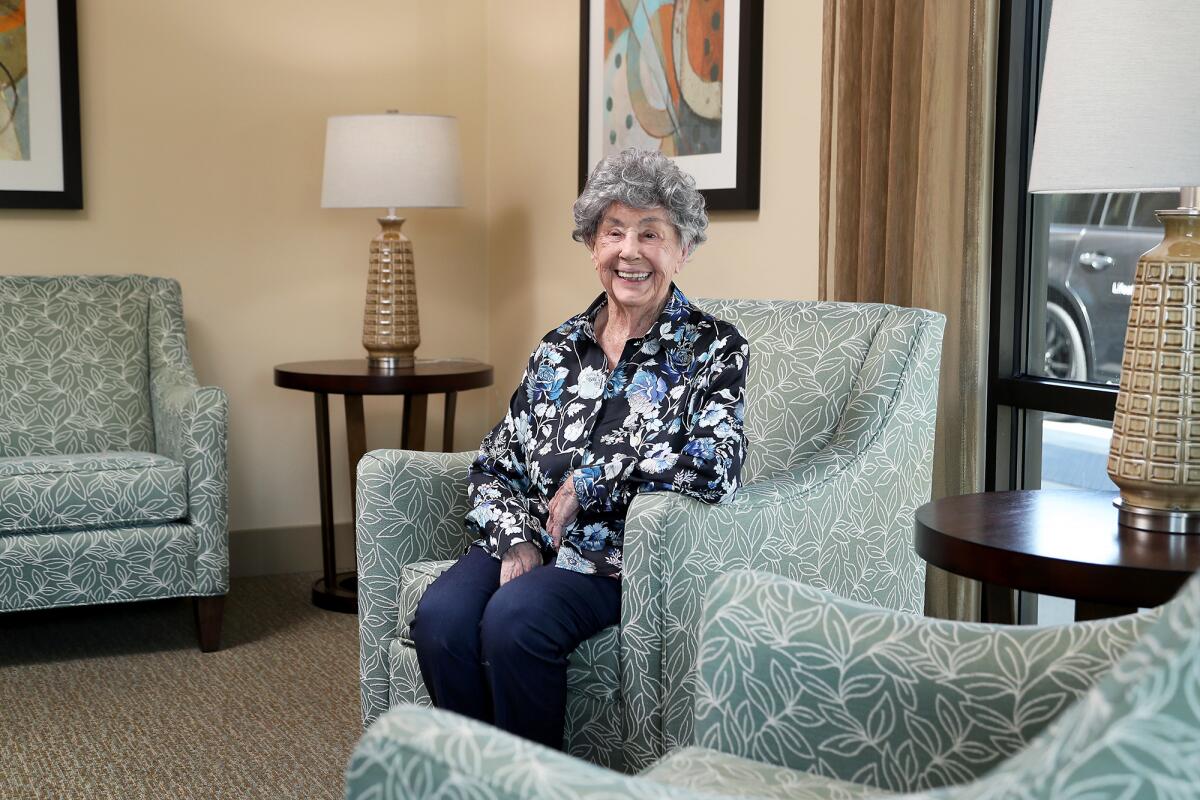‘A woman who flew’: 98-year-old Anaheim woman was member of the Civil Air Patrol during World War II

Many women broke barriers during World War II when they became pilots for the Civil Air Patrol, a citizen-led auxiliary unit of the U.S. Air Force.
While only about 3.5% of licensed pilots in the U.S. were women during the beginning of the war, about 20% of the patrol’s senior and cadet members were made up of female pilots by the war’s end.
Phyllis Turnbull, an Anaheim resident who turns 99 next month, was one of the trailblazing women of the Civil Air Patrol.
Turnbull graduated from UCLA with a degree in mathematics and went to work for Lockheed Corp., an aircraft company known today as Lockheed Martin.
Turnbull, then 20 years old, was working as a tool designer at the company when she saw an advertisement in the newspaper to receive a pilot’s license and 30 hours of flying time for only $500.
Turnbull had always spurned the traditional life.
“When I got out of school a lot of my friends couldn’t wait to get married,” Turnbull said. “I said that’s not for me. You do that and then you have somebody else to consider. So what’s your husband say when you want to go flying? I decided I wasn’t going to get married in a big hurry.”
Young and craving adventure, Turnbull took a leave of absence and went to Arizona to start her training.
Training occurred inland because flying was prohibited on the coast during the war, which the U.S. had just entered.
“I hadn’t really thought much about being a pilot before,” Turnbull said. “It just sounded like a great idea. I thought my folks would have a fit, but they didn’t say too much.”
In fact, Turnbull’s father had started training for his pilot’s license in the Mojave desert, where he was working as an air raid warden.
“He had to go out at night to make sure everybody taped their windows,” Turnbull said. “No light could be seen because the Japanese could bomb us.”
Turnbull remembers how her father had always wanted to fly. He worked as a mechanic for the Air Force — then a part of the Army — during World War I, but he never had a chance to enter a flying program.
While training, Turnbull slept in a barracks with other women who hoped to earn their licenses. Some of the women had husbands who were fighting in the war.
“Not many did finish or stay with it,” Turnbull said.
She said the training wasn’t easy, but there were calming moments in between.
“This young man, I was like 22, he was like 18 — he liked to dance and I liked to dance,” Turnbull said. “We went up to a tiny spot and they had a jukebox and we would dance.
“I never did see him after that. I don’t know what happened to him. Well you know, you see people and then they are gone.”

Turnbull and her father received their licenses, purchased a small plane and joined the Civil Air Patrol, though she had wanted to be a member of the Women Airforce Service Pilots, known as the WASPs.
The WASPs tested and delivered aircraft, and trained other pilots in order to free up male pilots for combat. Unfortunately, Turnbull didn’t meet the 5-foot-2 height requirement to join the group.
“I was too short because the planes didn’t have adjustable seats,” Turnbull said. “You had to be a certain height, I didn’t know that when I started.”
The Civil Air Patrol was started in 1941 to mobilize the country’s aviation resources toward the war effort. The group patrolled for submarines, monitored the borders and performed courier services.
Many women joined the Civil Air Patrol, feeling the need to contribute. It was one of the few groups where women could serve the country in uniform.
While still uncommon, the idea of a female pilot was becoming more familiar after Amelia Earhart spent the prior decade breaking barriers as the first female aviator to fly across the Atlantic Ocean by herself, among other accolades. She disappeared in 1937 during an attempt to fly across the entire globe.
“It seemed like you needed to do something because the men had all been drafted,” Turnbull said, adding that businesses and factories were “begging” women to come replace the men who went overseas.
Turnbull and her father were never asked to take part in any dangerous war-related efforts. Turnbull said they largely delivered goods domestically for the military.
After the war, Turnbull went to work for the Hughes Aircraft Co.
She was given a job in the flight office by Glenn Odekirk, right-hand man to famed business magnate Howard Hughes. Turnbull had met Odekirk while training for her license.
“It’s weird how I met and saw this man and had no idea who he was,” Turnbull said. “Pretty weird huh? That’s coincidence.”
She remembers that Hughes spent much of his time in the flight office. Turnbull was there when Hughes was almost killed in a highly publicized crash in Beverly Hills in 1946.
As a single mother of two, Turnbull spent time in a number of odd jobs to provide for her children, including 15 years as a tax preparer and a stint as a bridge instructor.
She hasn’t piloted since she was 28, after she and her father sold their plane due to the expensive upkeep.
Today, Turnbull is living in quarantine in the Emerald Court assisted living facility in Anaheim. She said she isn’t able to visit with her friends in the facility as much as she’d like to and isn’t able to see her kids due to the potential spread of COVID-19.
Rusty Young, a longtime friend of Turnbull’s, said the former pilot’s vision is fading.
“One day she said to me, ‘Oh, my eyes are getting worse, Rusty I don’t think I can see your face right now.’ I said, ‘Well you’re not missing anything, honey,’” Young said, laughing.
Young, who’s known Turnbull for 40 years, said they sometimes discuss the old days.
“I admire her because she was an aviator — I just couldn’t believe I knew a woman who flew,” Young said. “Especially doing it back in the day when women were looked down on to do anything exciting.”
Turnbull thinks often about her flying days. The joys of flying her parents and 92-year-old grandmother around. The time she had trouble locating the airport after a heavy fog rolled in over the Santa Monica Mountains. How small her home looked from on high.
“I missed it for a long time,” Turnbull said. “But you have to move on. Nothing lasts forever, that’s for sure.”
All the latest on Orange County from Orange County.
Get our free TimesOC newsletter.
You may occasionally receive promotional content from the Daily Pilot.




